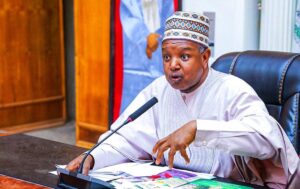Journalists, social media influencers, and public analysts have been called upon to ensure the accurate dissemination of information regarding Nigeria’s ongoing tax reforms, in a bid to curb the spread of misinformation and public misunderstanding.
This call was made by the Chairman of the Presidential Fiscal Policy and Tax Reforms Committee, Prof. Taiwo Oyedele, during an interactive media engagement held on Friday, October 3, 2025, in Lagos.
Addressing participants at the session, Prof. Oyedele emphasised the critical role of the media and digital communicators in shaping public perception of the recently enacted tax reform laws.
He warned that misinformation, misinterpretation, and unverified commentary could derail the core objectives of the reforms.
“Misinformation and uninformed analyses can undermine the goals of these reforms, which are ultimately designed to benefit ordinary Nigerians and support long-term economic stability,” he said.
The engagement, organised by the Tax Reforms Committee, is part of ongoing efforts to enhance public awareness, clarify misconceptions, and ensure transparent communication around the implementation of the reforms.
Prof. Oyedele stressed the importance of correcting false narratives, adding that the public deserves access to credible and simplified explanations of the reform policies.
“This initiative is to ensure that inaccurate information is either corrected, eradicated, or reduced to the barest minimum,” he noted.
“We are not asking journalists to report in favour of the reforms, we’re just saying, report objectively, report honestly, if you want to criticise, criticise constructively so that your reports are accurate.”
The newly enacted tax reform framework, signed into law by President Bola Ahmed Tinubu in June 2025, seeks to harmonise Nigeria’s tax system, eliminate multiple taxation, expand the tax net, and improve compliance while increasing benefits to taxpayers.
However, since its announcement, the reforms have been subject to public debate and confusion, with various platforms circulating conflicting interpretations of the law.
Read Also
According to the Committee, the new tax laws prioritize fairness, efficiency, and inclusivity. Key provisions include:
Personal Income Tax:
Individuals earning at or below the national minimum wage are exempt from tax.
Average-income earners will pay less, while the top 3% of high-income earners will contribute up to 25% — a rate still below those of Ghana (35%) and South Africa (45%).
READ ALSO: Tax Reforms Will Not Lead To Introduction Of New Taxes – FIRS
Value Added Tax (VAT):
Basic goods and services such as food, education, and healthcare are taxed at 0%, while rent and transportation remain VAT-exempt.
Small businesses are also exempted from charging VAT, reducing compliance costs.
Businesses will additionally benefit from broader input credits and faster refunds, which should lower consumer prices.
Tax Identification (Tax ID):
The Tax ID requirement applies only to business or income-generating bank accounts and is not a new identification system. It harmonizes existing Tax Identification Numbers (TINs) to ease transactions.
While banks will report large transactions quarterly, inflows into bank accounts will not be automatically taxed.
Informal Sector:
Small businesses with annual turnovers below ₦100 million are exempted from corporate income tax, VAT, and withholding tax obligations.
The Committee said this measure is designed to encourage formalization while supporting micro and small enterprises, which contribute significantly to national employment and GDP.
Tax Harmonization:
The Federal Government is working to reduce over 60 overlapping taxes and levies to fewer than 10, thereby easing compliance and curbing multiple taxation.
Several taxes introduced under previous administrations — including levies on airtime, data, bank transfers, and vehicle excise duties — have been suspended or reversed.





